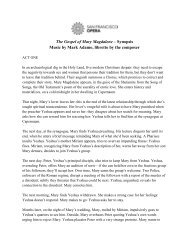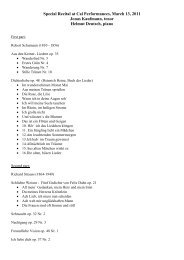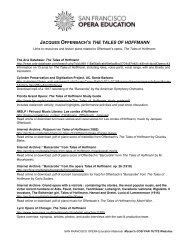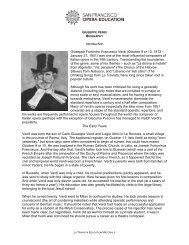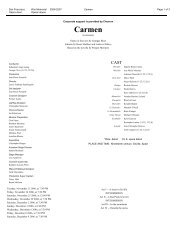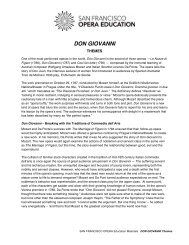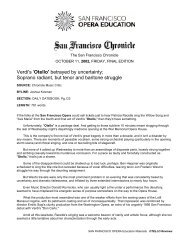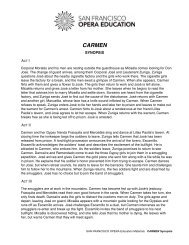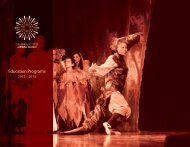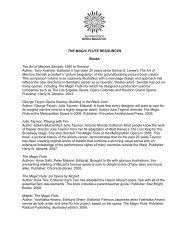Boris Godunov - San Francisco Opera
Boris Godunov - San Francisco Opera
Boris Godunov - San Francisco Opera
You also want an ePaper? Increase the reach of your titles
YUMPU automatically turns print PDFs into web optimized ePapers that Google loves.
Careers in <strong>Opera</strong><br />
<strong>San</strong> <strong>Francisco</strong> <strong>Opera</strong>, just like many companies, operates like a well-oiled<br />
machine:<br />
no one department functions alone. Instead, many departments<br />
have<br />
areas that overlap with one another and it is necessary for each department to do<br />
its share of the work in order for all the others to function.<br />
When you attend an opera, you will see and hear the work of the performers:<br />
singers,<br />
orchestra, chorus, and orchestra, but there are many behind the-scenes<br />
jobs that are necessary to make opera.<br />
<strong>San</strong> <strong>Francisco</strong> <strong>Opera</strong> is run by the General Director. The General Director has<br />
the final word on the Company’s policies and decisions from artistic to business<br />
planning.<br />
A General Director needs to travel to other companies in order to stay<br />
informed as to what is happening within the opera industry. He or she needs<br />
to know which new singers are becoming popular, which sets and costumes<br />
are the most striking to rent, and which operas the audience might enjoy. The<br />
General Director is the ambassador for the opera company, both within the<br />
community<br />
and abroad.<br />
At home in <strong>San</strong> <strong>Francisco</strong>, the General Director makes decisions about which<br />
operas should be part of the season schedule, called the season repertoire.<br />
Many of these decisions are made along with the Music Director. The Music<br />
Director in an opera company has the very important job of overseeing all<br />
musical aspects associated with the <strong>Opera</strong>. The Music Director not only<br />
needs to make decisions about the season repertoire and stay informed<br />
about singers who are performing, but also oversees the orchestra and the<br />
chorus.<br />
Sometimes the Music Director may act as the Conductor<br />
to an<br />
opera, one of the most important components of a performance.<br />
The Music Administrator functions as a researcher, historian and walking human<br />
encyclopedia for the company. When we produce a new opera, he is responsible<br />
for bringing together the composer and librettist and managing workshops on the<br />
piece. When we produce classic operas, he makes recommendations as to which<br />
version of the opera we should produce, and oversees orchestration and music<br />
library<br />
work.<br />
The Artistic Administrator works with the Music Director and the General Director<br />
in the hiring of singers. The Artistic Administrator deals with individual leading<br />
artists and their agents, making sure that they are available to sing with the<br />
Company and negotiating a salary and contract. Contracts are very important in<br />
opera because once the contract has been signed, it legally binds a singer to<br />
perform with the Company.<br />
Equally important as all of the artistic decisions, are the business choices that a<br />
company makes. The Managing Director of a company is the person in charge of<br />
the business aspects.<br />
<strong>San</strong> <strong>Francisco</strong><br />
<strong>Opera</strong>, like most performing arts groups, is a<br />
non-profit<br />
company.<br />
This means that the organization does not exist as a money-<br />
making<br />
business, but instead is a company that exists to present art, essentially<br />
functioning<br />
on a combination of ticket sales and fund-raising. Grand <strong>Opera</strong> is very<br />
38



